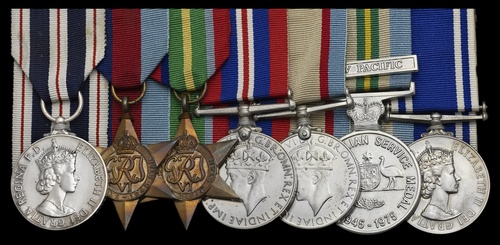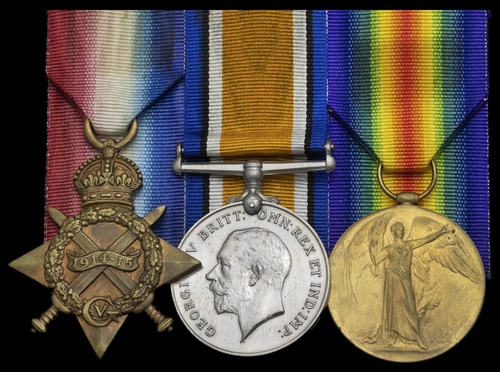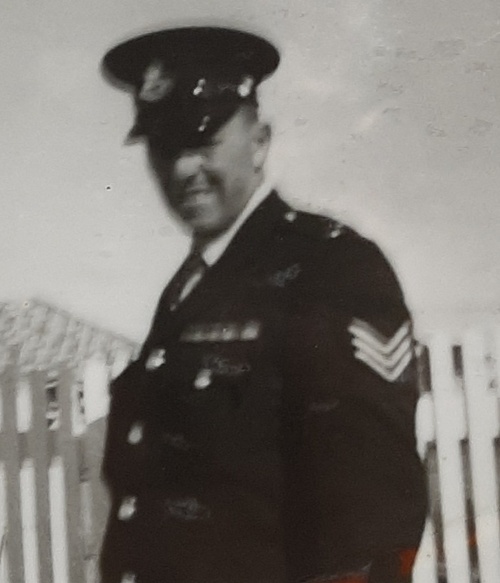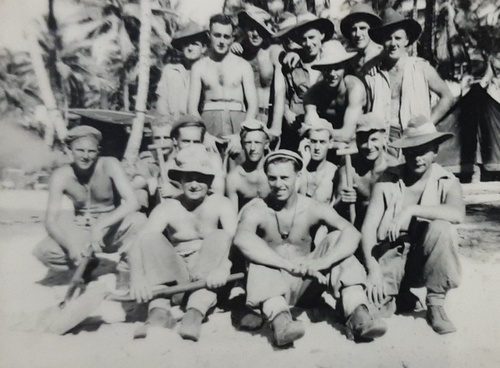Auction: 25001 - Orders, Decorations and Medals
Lot: 383
(x) Family group:
The exceptional and poignant Q.P.M. for Gallantry group of seven awarded to Sergeant 1st Class W. W. Riley, New South Wales Police, who was murdered by a deranged gunman he attempted to apprehend in the Sydney suburb of Toongabbie in September 1971
Queen's Police Medal, for Gallantry, E.II.R. (William W. Riley, Sgt. Cl. 1, New South Wales Police); 1939-45 Star; Pacific Star; War Medal 1939-45; Australian Service Medal 1939-45, these four officially impressed 'NX. 90169 W. W. Riley'; Australian Service Medal 1945-75, clasp, S.W. Pacific; Police Exemplary Service Medal, E.II.R. (William R. Riley), the last officially inscribed on pre-prepared ground, together with his 'Returned from Active Service' badge, officially numbered '170866', assorted N.S.W. Police Force badges (4), and a metalled nameplate from his burial service, good very fine (7)
The Great War campaign group of three awarded to his father, Sergeant C. U. Riley, Gordon Highlanders
1914-15 Star (S. 4226 Sjt. C. W. Riley, Gord. Highrs.), note second initial; British War and Victory Medals (S. 4226 Sjt. C. U. Riley, Gord. Highrs.), minor contact wear, very fine or better (3)
Q.P.M. London Gazette 25 May 1972:
'The Queen has been pleased to award the Queen's Police Medal for Gallantry to the late Sergeant 1st Class William Watson Riley and the late Sergeant 3rd Class Maurice Raymond McDiarmid, both of the New South Wales Police Force, in recognition of their gallant conduct in the following circumstances:
At a house in Toongabbie on 30 September 1971, Sergeants Riley and McDiarmid attempted to apprehend Ronald Desmond Clarke whom they knew to be armed and to have killed his brother and raped a woman. Sergeant McDiarmid forced an entry through the rear door of the house and Sergeant Riley gained an entry through the front door. Both policemen were armed with revolvers. In the events which followed three shots were fired by Clarke, two fatally wounding Sergeant Riley and the third inflicting grievous wounds to the head of Sergeant McDiarmid who died shortly afterwards. Neither officer fired his own revolver. Sergeant Riley and Sergeant McDiarmid both showed outstanding courage and devotion to duty and upheld the high traditions of the New South Wales Police Force.'
William Watson Riley was born in Motherwell, Scotland on 22 February 1921, the son of Great War veteran Cecil Urquhart Riley. The family migrated to Australia when he was a child, and William was working as an orchardist when he enlisted in the Permanent Australian Military Forces (A.M.F.) in April 1940, aged 19.
Having then served in the A.M.F. as a driver in the Australian Army Service Corps, he took his discharge in March 1942 and immediately re-enlisted in the Australian Imperial Force. Posted to the Guerilla Warfare School in Melbourne, he joined the 2/6th Independent Company (Commando) in May 1942. By the time of his discharge from 2/9th Australian General Hospital in December 1945, he had served for two years on active operations in Morotai and New Guinea.
Riley next joined the New South Wales Police, attending the Sydney Metropolitan Training Depot before taking up traffic duties at Camperdown and Regent Street police stations. In May 1947 he qualified as a solo motor cyclist and in August 1949 as a motor driver. In November 1950 he received his first commendation when, off duty, he rendered valuable service in combatting a fire which occurred at the railway depot at Bowenfels.
Advanced to Constable 1st Class in December 1952 and to Senior Constable in July 1958, he received another commendation in the summer of 1959, his service record stating:
'Commended for the excellent work performed, under adverse conditions, during the search for Bryan Thomas Bullock and Anthony James Forster who escaped from Berrima Training Centre on 29 May 1959, and were recaptured by Police near Bigga on 3 June 1959.'
For much of the coming decade Riley was employed on general duties - at Bathurst, Parramatta and Blackdown stations - and he received further advancement to Sergeant 3rd Class in March 1960 and to Sergeant 2nd Class in July 1967. He was also awarded his Police Exemplary Service Medal in September 1968.
A 'blood bath'
Of the above cited events in Toongabbie on 30 September 1971, numerous reports appeared in the Australian press. For it was indeed - as observed by an eyewitness to those events - a blood bath. There were four fatalities within a matter of hours.
Riley and McDiarmid were serving at Blackdown Police Station at the time, when a distraught women rushed in and reported a shooting and her rape at 1 Mimosa Avenue. It was later ascertained that a heavily armed and desperate gunman, Ronald Clarke, aged 23, had earlier shot his brother there.
Both officers were dispatched to the address in question, in order to investigate further, although it was believed the gunman had long since fled the scene. He hadn't. He was preparing to dispose of his brother's body when the two officers arrived. The offender ran to the rear of the house and McDiarmid did likewise, making a forced entry at the back door, before being fatally wounded from a shot delivered by Clarke. Riley, meanwhile, made a forced entry at the front door, only to be twice shot by Clarke with a .22 rifle, one bullet lodging in lodging in his spine and the other fracturing his skull. The wounds were fatal and he died instantly, but McDiarmid survived his wounds a little longer, dying in an ambulance on his way to Blackdown General Hospital.
Clarke sped off in a getaway car but was tracked down by a pair of patrol officers in the suburb of Lurnea. They rammed the fugitive's vehicle off the road and one of the officers - on being threatened with a revolver - shot him dead.
The tragic scene at 1 Mimosa Avenue was later described by a neighbour in a newspaper report:
"I went around the back of the house and saw a policeman's bloody hand grasping the door," she said.
"It was horrible … I'll never forget it."
Mrs. Roberts said that when she reached Constable McDiarmid, he was slummed in the doorway.
"He was sitting in the doorway with his face shot away."
"He was still conscious but couldn't talk," she said.
"He kept pointing inside the house."
When she went in, she found Sergeant Riley lying dead in the lounge room.
In the bedroom, she found the body of Warren Clarke, wrapped up in sheets.
"The house was a blood bath from front to back," she said.
"I rushed out and stopped a bread delivery woman who went to contact the ambulance. Then I ran to a neighbour's house to tell her what had happened."
Mrs. Roberts said she and her neighbour, Mrs. Dawn Harris, went back to the house and tried to help the dying constable until an ambulance arrived.'
Both officers were buried with full police honours, as related in another newspaper report:
"Blacktown came to a standstill yesterday to pay tribute to Sergeant William Riley and Senior Constable McDiarmid who were shot dead last week.
A hush fell over the town and thousands of people lines the streets to watch the almost mile-long funeral cortege pass by.
Others crowded windows and rooftops of buildings and the railway bridge along the route.
Simultaneously, police lined up outside every police station in the State and observed two minutes silence in honour of their dead comrades … a joint funeral.'
Both men were posthumously promoted and awarded the Queen's Police Medal for Gallantry, Riley to Sergeant 1st Class. He left a widow and two children.
Sold with a file of comprehensive research, including numerous police, eyewitness and newspaper statements and reports concerning the murder case, together with photographs of the funeral possession.
For his miniature dress medals, please see Lot 455.
Cecil Urquhart Riley was born in Grantham, Lincolnshire in about 1881. He moved to Scotland and was working as a railway porter when he married Janet Watson in Glasgow in July 1902.
He was likely a regular soldier before the outbreak of the Great War, for he was serving in the rank of Sergeant in the Gordon Highlanders on his arrival in France in July 1915. Discharged to the reserves in October 1918, he emigrated to Australia in the mid-1920s and died at Wyong, N.S.W. in 1955.
Subject to 5% tax on Hammer Price in addition to 20% VAT on Buyer’s Premium.
Sold for
£4,500
Starting price
£1100











